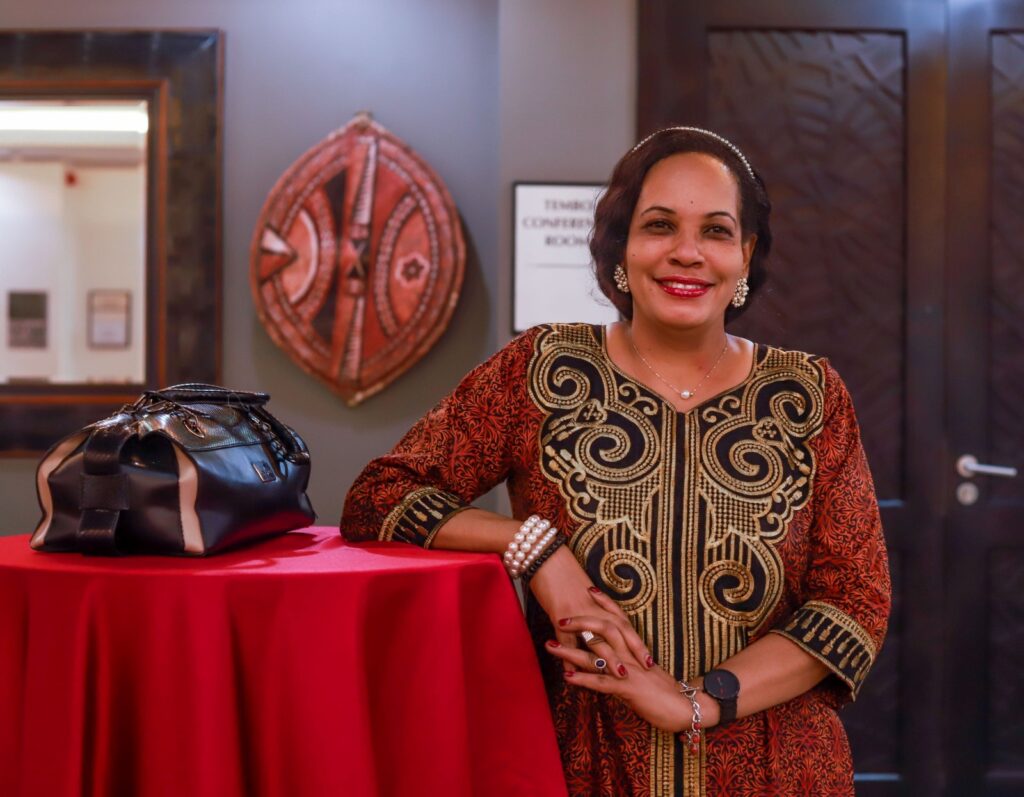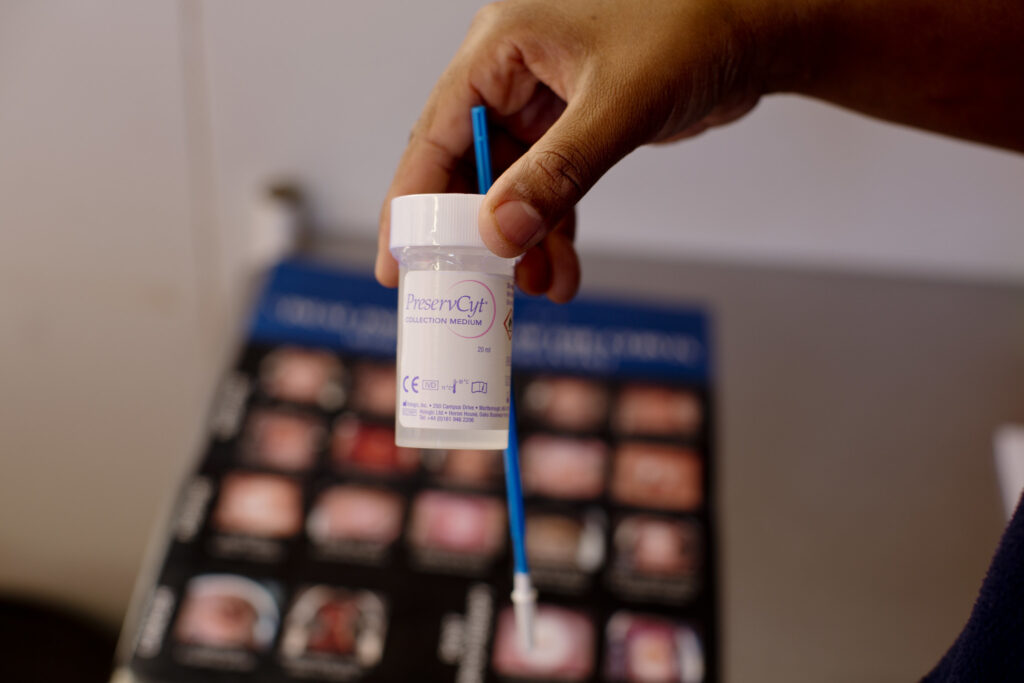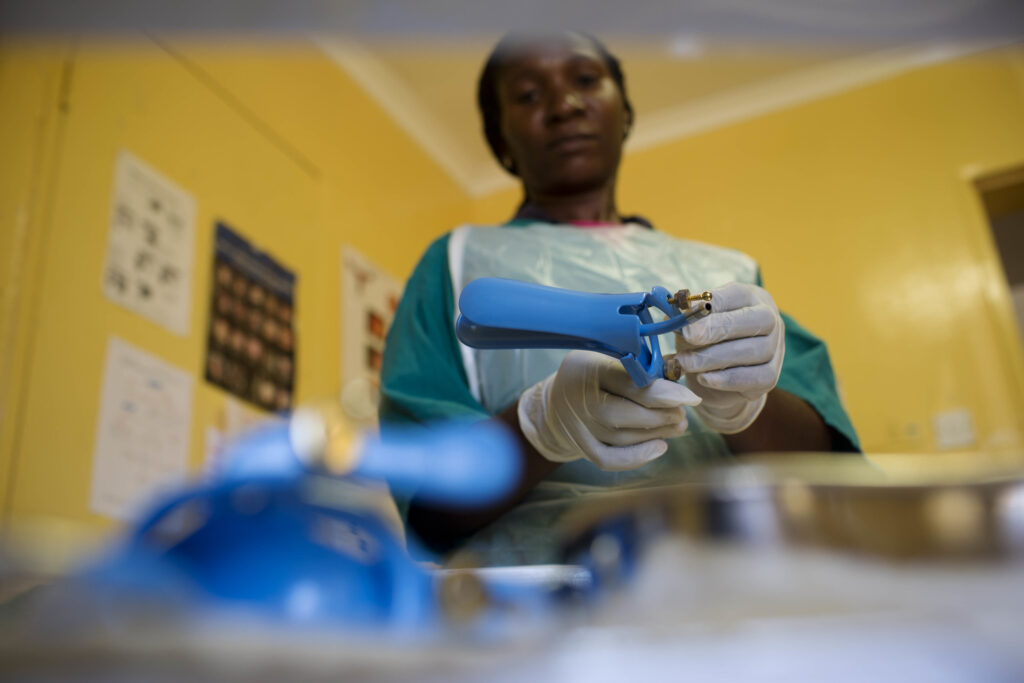Cervical cancer is the deadliest cancer for women in Tanzania. As Jhpiego’s women’s cancer expert in the country, Dr. Mary Rose Giattas is working to change that. In recognition of World HPV Day (March 4), Jhpiego’s Katherine Seaton talked with Dr. Giattas about why Jhpiego’s approach to cervical cancer prevention, screening and treatment has worked in Tanzania and the barriers they’ve faced along the way. This conversation has been edited for length and clarity.

Q: Good morning, Dr. Giattas. Can you talk about what Jhpiego, in partnership with the government of Tanzania, has been doing to reduce deaths due to human papillomavirus (HPV)?
A: Cervical cancer is the leading cause of cancer among women in Tanzania, with around 10,000 new cases and 7,000 deaths per year. Jhpiego has been working very closely with the Ministry of Health at national and subnational levels since 2010 to support their rollout of cervical cancer screening and treatment services. We first started working with them to build the national cervical cancer prevention program and then helped develop guidelines, training packages, informational materials, data collection tools and advocacy plans. We also trained trainers and health workers to provide screening and treatment services and conduct facility-based supportive supervision and mentorship.
At Jhpiego, we believe that we need to provide primary, secondary and tertiary care. That means focusing not only on screening and treatment but prevention as well. So we helped operationalize visual inspection of the cervix and immediate treatment options with either cryotherapy (freezing abnormal cells to destroy them) or thermocoagulation (heating abnormal cells to destroy them) in the health facilities we support.
In 2018, Tanzania introduced HPV vaccines to 14-year-old girls in all 31 regions of the country and Jhpiego supported those rollout efforts in seven regions through USAID’s MOMENTUM Country and Global Leadership project (MOMENTUM). We worked with partners to help increase uptake of the vaccine and scale up services by strengthening their capacity to provide the vaccines. Now, more than 7,000 facilities offer the two-dose HPV vaccine. When we started working to increase screening and treatment services in 2010, only three facilities provided them. Today, more than 1,300 facilities do.
But the biggest step forward is that in April 2024, Tanzania will be switching to a single-dose vaccine targeting girls ages 9 to 14.
Q: It sounds like this is something you’ve been waiting for. Is this a game-changer for Tanzania?
A: This will be a huge relief because we’ll be able to reach more girls. Tanzania has been struggling with the two-dose vaccination, especially getting girls the second dose. It has been very challenging because of multiple factors including drop outs and transfers to other schools.
Another challenging factor is that since a majority of the schools are far away from health facilities, it has been very hard for health care providers to travel for round two of the vaccination if they don’t have a transportation allowance for outreach services.
A one-dose approach will eliminate those challenges and help us reach the World Health Organization’s goal of vaccinating 90% of girls, which is significantly important for the reduction of cervical cancer mortality.
And personally, for me, reaching the 90% goal is very important. When I was 13, my mother died of breast cancer. She was only 42. Since then, I’ve had a passion for women’s health and specifically making sure children don’t suffer by losing their parents at a young age due to preventable diseases. I feel I’m duty bound to contribute and help adolescent girls become healthier. I’m a professional, a technical advisor, an expert and an advocate—but I’m also a mother, a sister and friend to many.

Q: You’ve certainly committed yourself to ensuring girls have bright futures ahead of them. What are some of the key factors you always make sure are part of a Jhpiego-supported HPV campaign?
A: Jhpiego is currently supporting HPV vaccination services in six regions through MOMENTUM. In Zanzibar, we just recently conducted a campaign from June to December 2023 through MOMENTUM.
When we roll out an HPV initiative, we always make sure that:
- We have a strong partnership with the Ministry of Health, President’s office, Ministry of Education and local stakeholders.
- We include health care providers and teachers in the vaccine implementation services according to Ministry of Health standards.
- We plan and prepare well in advance and engage all stakeholders from the beginning.
- We target and enroll adolescent girls well in advance so that we have benchmarks at the beginning and can track progress.
- We have all the supplies and equipment needed to reach implementation goals.
- We set targets from the beginning and conduct strategic monitoring, including daily data updates, to determine if any gaps need to be addressed along the way.
In Zanzibar, we worked very, very closely with the Ministry of Health and we have strong partnerships with all of the district councils on the island. In June, we started meeting with key stakeholders who are important to ensuring we have a successful program. Together, we developed our own targets for the island. Then we worked with a multidisciplinary team who trained health workers in 183 facilities.
We first identified how many 14-year-old girls were in school, which determined how many vaccination teams and supplies we needed. Then, the health workers started going to schools to provide the first dose and by December, we reached our vaccination goals, going from 32% coverage to 95%. We also integrated other services during implementation of this campaign including nutritional assessments, visual assessments and comprehensive adolescent group education.”
Dr. Mary Rose Giattas
Q: This sounds like a successful campaign in Zanzibar. Did you encounter any challenges along the way and how did you address them?
A: A major challenge was that some of the schools were conducting exams so we had to wait until they were over to conduct the vaccination campaigns.
We also have to convince the girls, their parents and community members that the vaccine is a positive thing. We’ve found that information campaigns really work well in terms of acceptability of the vaccine among girls and their parents. We use schools to communicate with parents because we know parents are more engaged with their child’s school than a health facility. We make sure to distribute helpful materials during teacher-parent meetings and we also maximize a teacher-parent WhatsApp group. Social media is very powerful in the country. We use WhatsApp and Facebook to reach a majority of the adolescents and then Facebook also helps us reach others girls who aren’t in schools.
To inform the communities, we use multiple platforms including press releases and media, and engage community leaders, religious leaders and policymakers, so that they can also be very, very positive in educating the community about the benefits of the HPV vaccination. This is important because sometimes religious leaders relate the vaccine with infertility and many community leaders will speak negatively about the HPV vaccine, which spreads misinformation.

Why do you think Tanzania has been more successful rolling out the HPV vaccine compared to other countries?
A: The driving force is the girls themselves. If they understand what cervical cancer is, what the symptoms and signs are, they will understand why the vaccine is important. When we go in and talk to girls about what cervical cancer is and why vaccination is important, over 99% of them raise their hands when we ask if they wanted to be vaccinated.
A second driving force is our leaders. I really want to shout out the political commitment at the government level. Our Excellency the President of Tanzania, Samia Suluhu Hassan, has been a huge driving force to the success. She’s very supportive of women’s health, as is our current Minister of Health, Our Excellency Ummy Mwalimu, and Minister of Health for Zanzibar, the Honorable Nassor Ahmed Mazrui. They all want to see success in our country and that attitude trickles down to all levels.
I think these HPV vaccination interventions will change the status quo and help us reach global cervical cancer elimination targets in Tanzania. I’m so excited and humbled to be part of this agenda.
Dr. Mary Rose Giattas is director for USAID’s MOMENTUM Country and Global Leadership project, led by Jhpiego, in Tanzania. Katherine Seaton is communications manager for the Jhpiego U.S. office.



